‘A difficult situation has arisen’: why Kazan drowned in garbage
Regional operator claims that it does not have enough funds to organise the normal MSW disposal
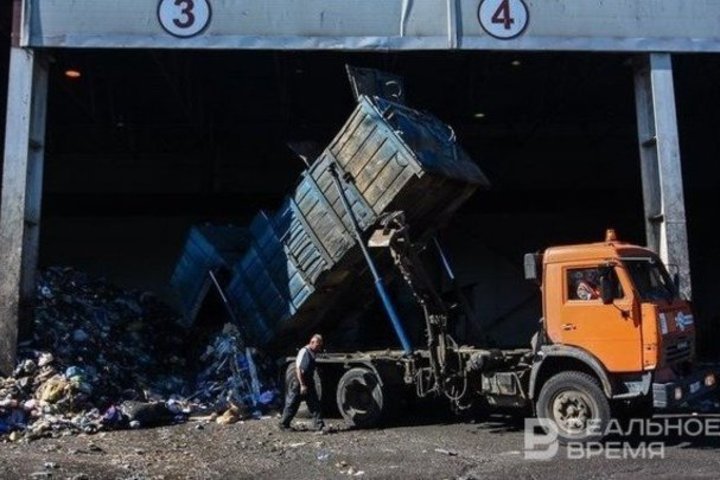
Kazan settlements are suffocating from garbage, trash enclosures are not equipped and look like a spontaneous landfill. Kazan residents have been complaining about the untimely garbage collection and the disgusting condition of the MSW collection sites for a long time, and the flow of claims is increasing: if last year the People's Control of the Republic of Tatarstan received 1,583 appeals with “garbage topics”, then in the first half of this year alone — 1,113, and in the last month, as of the date of preparation of this the material — 175. The reasons why Kazan covers the garbage “ninth wave”, the contents of garbage containers, gaps in legislation and the shortage of waste collection sites were dealt with by Realnoe Vremya.
Complaints are getting more and more
This year marks the 5th anniversary of the “garbage reform”, which began in 2019 under promises to restore order in the collection and disposal of MSW. As a result, payments for the removal and disposal of garbage have increased significantly, and they are charged from citizens — strictly from a square metre of living space, and from entrepreneurs — according to standards, often many times exceeding the real volume of waste, but the money is not for its advantage.
In 2020, the People's Control of the Republic of Tatarstan recorded a small number of complaints about garbage collection — citizens did not worry about it in the Covid pandemic. But already in 2021, 856 “garbage-related” appeals were received from Kazan alone, 965 — in 2022, and 1,583 — in 2023. And in the first half of 2024 alone, 1,113 complaints were recorded. Over the past month, on the date of preparation of this material, Kazan residents complained 175 times about the ugly state of the MSW sites, so by the end of 2024, the number of complaints from the population to scavengers may well double last year's.
The executive committee of Kazan informed Realnoe Vremya that there are 2,495 container sites for the collection of MSW in the city, of which 401 are located on the municipal territory in the residential housing zone. And they assured that “all sites are equipped according to the sanitary regulations and standards.”
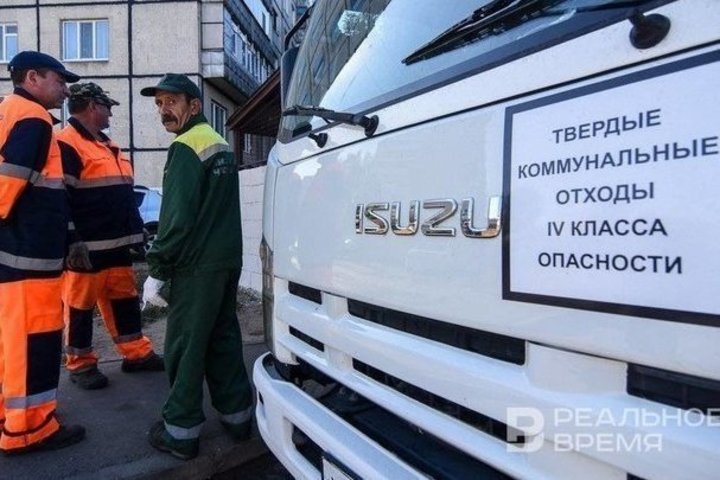
The worst is in the villages
“Currently, a difficult situation has arisen regarding the timely removal of waste in residential areas of the city of Kazan and the municipal districts closest to the capital," PZhKH told Realnoe Vremya. “The most problematic areas are located in the residential housing area of the Aviastroitelny district. The key reason for the problems is the lack of collection sites. There are 14,000 residents and 46 MSW collection sites in the Aviastroitelny istrict, with an average of 300 people per site or bunker. The situation in the Sovetsky district is even more acute: 97 sites for 23,400 people — 616 people per bunker. According to the standard, we have to dispose 135,000 cubic metres of MSW a year, but we dispose 51,000 cubic metres per month.
PZhKH management company stated that the export of MSW from Shosseinaya Street in the village of Aki is carried out regularly, but “there were problems with the bulk of non-MSW outside the collection site, they were cleaned up in the middle of September.” .
The company clarified that the cleaning of problematic MSW collection sites is carried out by “flying” teams, and up to 8.5 million rubles are spent on this monthly, but these costs are not included in the tariff, and the issue of financing these works has been considered and has not been resolved for a whole year.
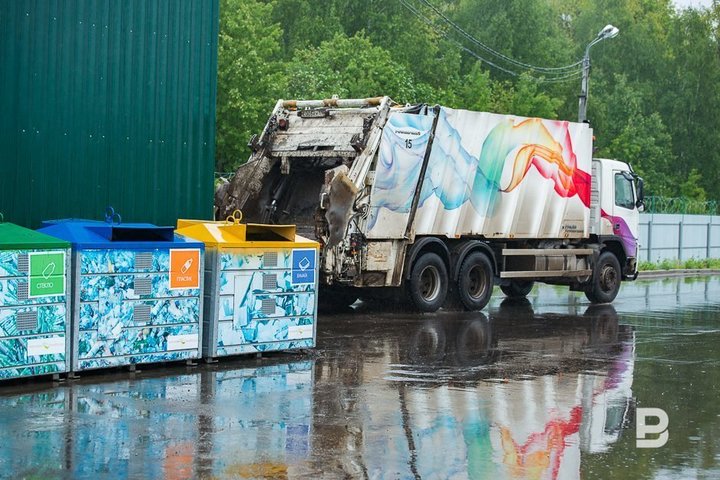
“Federal Law No. 89-FZ in Article 8 refers to the powers of local governments in the field of MSW management to create and maintain MSW accumulation sites, except for cases established by the legislation of the Russian Federation when such an obligation lies with other persons. However, measures to eliminate these wastes from the places of accumulation of MSW are not being taken by the Administration of the Aviastroitelny and Novo-Savinovsky districts of Kazan," PZhKH emphasised.
They also answered the question of how often MSW must be collected from collection sites:
“In accordance with SanPiN 2.1.7.3550-19, in cold weather (at an average daily temperature of +5 ° C and below), garbage collection is carried out at least once every three days. During the warm period (at an average daily temperature above +5 °C), garbage trucks must collect MSW daily. The schedule of disposal from the sites is built according to the SanPiN, and from the sites of gardeners' non-commercial partnerships, legal entities and housing cooperatives — according to an individual agreement as the containers are filled.
There are not enough sites and money, and there are plenty of violators
The regional operator for MSW management PZhKH is engaged in the collection and disposal of waste in Kazan and 21 municipal districts, serving more than 2 million residents of Tatarstan. Today, MSW is collected from 18,819 container sites, where 49,182 waste collection containers are installed, including 1,788 metal mesh containers designed for separate collection.
According to the regional operator, about 8 million cubic metres of MSW are generated annually in the western zone of the Republic of Tatarstan, most of them in Kazan. About 650,000 cubic metres of waste are exported to Kazan every month, 20% of them — about 130,000 cubic metres — from the territory of the housing and communal services.
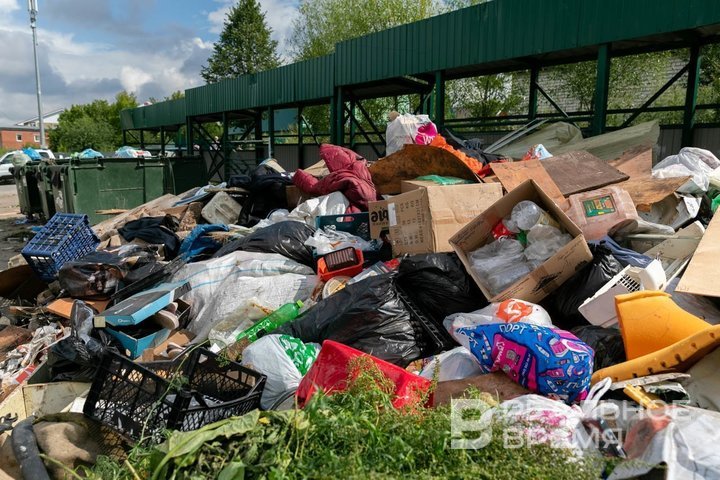
PZhKH management company listed its main problems, noting that they stem from one another:
- insufficient number of container sites, specifying that the city is growing, over the past 2.5 years alone, more than 2,000 new households have been commissioned in the settlements of the city of Kazan, and 751 container sites should function on the territory of the settlements, but there are only 393, while municipalities “face difficulties in organising them due to the lack of territory for their construction”;
- unauthorised landfills and shadow schemes for the export of MSW (the so-called “gray carters”), which store non-MSW waste at sites for the collection of MSW. On the territory of the Western Zone of PZhKH management company has identified 154 such problematic container sites, where there is a systematic over-accumulation of waste, their elimination entails a financial burden on the organisation that is not provided for by the tariff;
- the lack of systematic cleaning of the adjacent territory to the container site by its balance holders. According to PZhKH, there are 393 container sites on the territory of individual residential development in Kazan, where cleaning is carried out by the company's “flying” crews, although the maintenance of MSW accumulation sites belongs to the authority of municipalities;
- inconsistencies in terms of pricing in the field of MSW management, since, according to representatives of PZhKH, the actual exported volumes of MSW annually exceed the values of the volume fixed in the territorial scheme by an average of 12%, and the tariff increase does not cover the costs of transportation and disposal of waste.
“The increase in the tariff for the service for the treatment of MSW in 2024 amounted to only 4%," PZhKH reported. “Car repair services and the cost of spare parts increased by 20-30%, fuel prices — by 13%, the average market salary of garbage truck drivers, movers and handymen — by 20%. The lack of funds leads to the impossibility of timely purchase of containers and bunkers, hiring special equipment to clean up piles of garbage and, as a result, leads to the impossibility of timely high-quality waste removal.
Audit results
In the summer of 2024, the Prosecutor's office of the Aviastroitelny district, together with inspectors from the Ministry of Ecology and Natural Resources of the Republic of Tatarstan, checked 15 MSW collection sites in urban settlements and found violations at all. As a result of the inspection, an administrative offense case was initiated against the regional operator, and an idea was sent to the Executive Committee of Kazan on the elimination of violations regarding the organisation and maintenance of waste accumulation sites. But in general, this did not affect the situation with debris due to systemic problems.
One of the most painful questions is the question of who should put the MSW collection site in order, since the regional operator is not paid for this. The problem of removing construction debris is no less acute, and in villages there is also waste that is generated on the sites — branches, weeds, tops, which local residents dump into containers, and if there is not enough space in them — nearby, increasing the volume of waste at times.

As a result, if the garbage truck driver discovers construction debris or other non-MSW waste in the container, they take a photo of the violation, and leave the garbage not included in the tariff in place.
The administration of the Aviastroitelny and Novo-Savinovsky districts informed Realnoe Vremya that “for organic waste of plant origin, compost pits or heaps should be organised by the owners on the territory of households, and tree branches should be crushed, and construction debris should be disposed of separately at an additional tariff.”
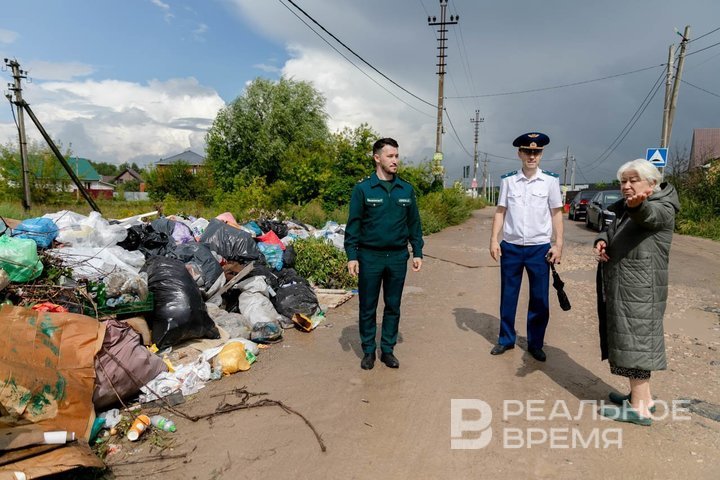
The district administration also noted that although video surveillance and photo fixation cameras are installed at many sites for the collection of MSW, the administration is not authorised to impose fines for violations recorded by these cameras. In addition, when dumping waste, “gray scavengers” close the license plate cameras of cars.

After the non-collected garbage, where construction and other waste are mixed with MSW, is discovered by inspectors of the Ministry of Ecology and employees of the Prosecutor's office and prescriptions are issued, the municipality puts waste collection sites in order at the expense of the budget — until the next violation.
Another target?
The regional operator believes that in order to solve problems with MSW, it is necessary to adopt a targeted program, the task of which will be the construction of new container sites, the reconstruction of unequipped sites with the organisation of places for storing large-sized waste or the installation of a storage bunker.
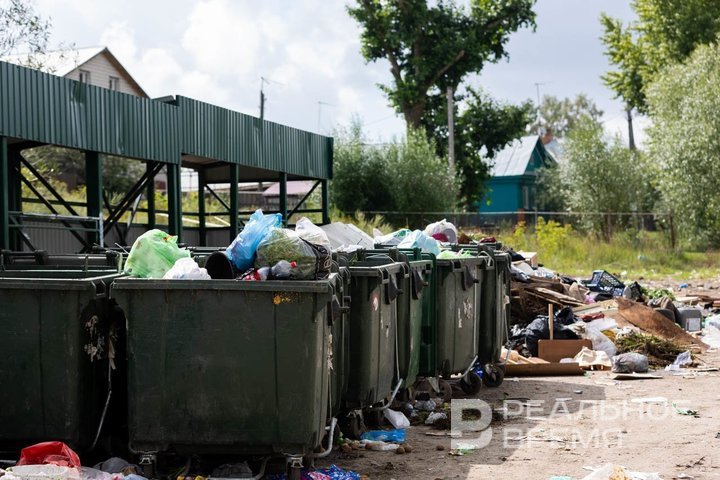
To prevent violations, the company proposes to equip all sites for the accumulation of MSW with video cameras on the territory of settlements, place information boards banning the storage of waste not related to MSW, and regularly check the places of unauthorised waste disposal. However, it is still unclear who should finance and carry out this. Besides, in order to do this legally, it is necessary to change the Rules of landscaping and introduce more impressive fines for violations than are currently in force, the company says.
“For our part, we propose to put container bunkers for construction debris separately on the same sites and conclude additional contracts between the local government and the regional operator for its removal," Ruslan Gusamov, Deputy Prosecutor of the Aviastroitelny district, cited another solution to the problem. “Perhaps it will be cheaper than regularly clearing the resulting debris. After all, each such clearing costs about half a million rubles! However, the solution to this issue depends on the local authorities, we can only express our thoughts and propose to deal with the problem systematically, not occasionally. But we see that the problem is getting worse: such an inspection is carried out annually, and this summer the problem with garbage collection has become most acute.